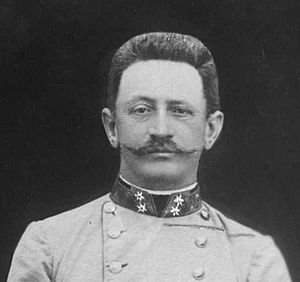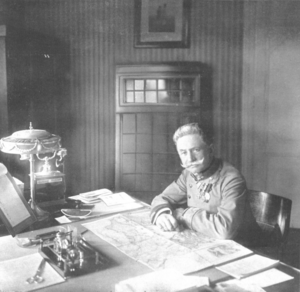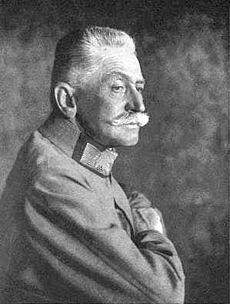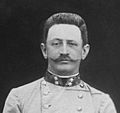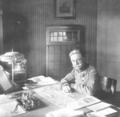Franz Conrad von Hötzendorf facts for kids
Quick facts for kids
Graf
Franz Conrad von Hötzendorf
|
|
|---|---|
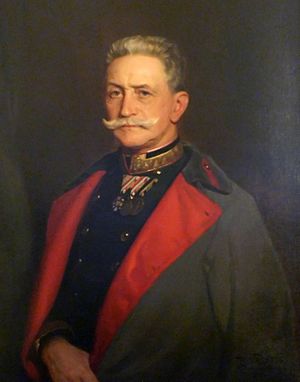
1915 portrait, Heeresgeschichtliches Museum, Vienna
|
|
| Born | 11 November 1852 Penzing, Vienna, Austrian Empire |
| Died | 25 August 1925 (aged 72) Mergentheim, Württemberg, Weimar Republic |
| Allegiance | |
| Service/ |
|
| Years of service | 1871–1918 |
| Rank | Field Marshal |
| Battles/wars | First World War |
| Awards | see below |
Franz Conrad von Hötzendorf (born November 11, 1852 – died August 25, 1925) was an important Austrian general during World War I. He was the Chief of the General Staff for the Austro-Hungarian Army and Navy from 1906 to 1917. This meant he was the top military leader.
Conrad believed that the Austro-Hungarian Empire was in danger of breaking apart. He often suggested starting a war against Serbia to prevent this. When World War I began in 1914, he was in charge of the Austro-Hungarian military.
His armies faced many challenges. They relied more and more on support from their German allies. In March 1917, Emperor Charles I removed him from his position as Chief of Staff. Conrad then led an army group on the Italian Front until he retired in 1918. He passed away in 1925.
Contents
Life of Franz Conrad
Conrad was born in Penzing, a suburb of Vienna, Austria. His family had a history of military service. His great-grandfather was given a noble title in 1815. Conrad's father, Franz Xaver Conrad, was a retired colonel who had fought in important battles.
In 1886, Conrad married Wilhelmine le Beau. They had four sons together. After Wilhelmine died in 1905, Conrad sometimes felt very sad. He later married Virginia von Reininghaus in 1915.
Military career beginnings
Conrad started his military training at the Hainburg cadet corps. He also studied at the Theresian Military Academy in Wiener Neustadt. He was very interested in natural science, especially Charles Darwin's ideas about evolution.
In 1871, at 19, he became a lieutenant in a Jäger (light infantry) battalion. After more training, he joined the General Staff Corps of the Austro-Hungarian Army in 1876.
From 1878 to 1879, he worked in the provinces of Bosnia and Herzegovina and Sanjak of Novi Pazar, which were under Austro-Hungarian military control. He became a Captain and helped during an uprising in Dalmatia in 1882. In 1886, he became Chief of Staff for the 11th Infantry Division. He was good at improving military training exercises.
In 1888, Conrad was promoted to Major. He became a professor of military tactics at the Kriegsschule military academy in Vienna. He was a popular teacher among his students.
Becoming Chief of Staff
In 1892, Conrad returned to leading troops. He commanded the 93rd Infantry Regiment. Later, he led the 1st Infantry Regiment and then the 55th Infantry Brigade. He became a Generalmajor in 1899. In 1903, he took command of the 8th Infantry Division.
In November 1906, Conrad was chosen to be the Chief of Staff for the Austro-Hungarian military. This was suggested by Archduke Franz Ferdinand, who was next in line for the throne. Conrad was known as a good teacher and writer about military ideas. He had not fought in many battles himself, but he had studied military theory a lot. His books on infantry tactics were popular. He strongly pushed for the army to be more modern. In 1908, he became a General der Infanterie.
In 1910, Emperor Franz Joseph I of Austria gave Conrad the noble rank of a Freiherr (similar to a Baron). Conrad often disagreed with the Foreign Minister, Alois Lexa von Aehrenthal, about starting a war with Italy. These disagreements led to Conrad being removed as Chief of Staff in 1911. However, after Aehrenthal resigned and died, Archduke Franz Ferdinand pushed for Conrad to be put back in charge. This happened in December 1912, during the Balkan Wars.
Historians say that Conrad was a "loner" and not very good at politics. However, his ideas had a big impact on the government's decisions, especially before World War I.
Conrad and World War I
War planning and challenges
Conrad was proud of his detailed war plans. He made different plans for fighting against various enemies. However, his plans did not consider fighting both Russia and Serbia at the same time. He also kept his plans secret from his own country's leaders.
Conrad's plans assumed he would have more soldiers and better-trained ones than he actually did. His plans were based on old railroad schedules from the 1870s. He did not listen to warnings that Russia had much better railroads now. Conrad thought the war would be won in six weeks. He believed Russia would need 30 days to get its troops ready, and his own armies could be ready against Serbia in two weeks.
When the war started, there were many delays. Conrad made things worse by changing plans in the middle of getting troops ready. Russia mobilized its army much faster than expected.
When Archduke Franz Ferdinand was assassinated in July 1914, Conrad was the first to suggest going to war against Serbia. Germany wanted an immediate invasion, but Conrad waited for over a month. Many soldiers were on leave to help with the harvest and were not due back until July 25. Canceling their leave would hurt the food supply and alert other countries to Austria-Hungary's plans.
Battles and outcomes
On August 12, 1914, Conrad sent about 400,000 men into Serbia. They suffered a big defeat against the Serbs in the first months of the war. On August 22, he started an even larger attack against Russia in Galicia. After some early wins, his forces faced defeat and lost Lemberg. Conrad had underestimated Russia's strength and speed, and his own army's weaknesses. However, his troops won a big victory at Limanowa in December 1914, saving Cracow.
After Germany won major battles, they had resources to help Austria-Hungary. Even though Conrad was officially in charge, German forces increasingly took control. Germany sent large armies, and together they conquered parts of Serbia, Montenegro, and Romania. They also helped stabilize the Italian front.
Conrad wanted to take over the lands they had occupied. He often worked against the Hungarian prime minister and the Austrian minister president. His relationship with the German Supreme Army Command also became difficult.
Losing power
When Emperor Charles I of Austria became ruler in November 1916, Conrad was promoted to field marshal. He was one of only three men in Austria-Hungary to hold this high rank at the time. However, the new emperor gradually reduced Conrad's power. In December, Emperor Charles took over as commander-in-chief of the army and navy. On March 1, 1917, he officially removed Conrad from his position as Chief of Staff.
Conrad asked to retire, but the emperor asked him to stay. Conrad agreed and was put in command of the South Tyrolean Army Group.
In the spring of 1918, Austro-Hungarian attacks against the Italians failed, with many soldiers lost. This brought criticism to the leaders. Conrad was seen as someone who wanted to keep the war going. Because of this, Conrad was dismissed on July 15, 1918. At the same time, he was given the noble rank of a Graf (count) and an honorary position as a Guard colonel.
Later life and death
After the war, Conrad said he was not to blame for the war starting or for Austria-Hungary's defeat. He blamed the Imperial court and politicians. He died on August 25, 1925, in Germany.
When he was buried in Vienna on September 2, 1925, over 100,000 people attended. His special grave was later changed to a "historical grave" in 2012. In April 1919, when Austria became a republic and abolished noble titles, Conrad's name became simply Franz Conrad-Hötzendorf.
Conrad's strategies and legacy
Conrad's reputation as a commander is still debated. Some early historians thought he was a military genius. More recent historians say he was not successful. One military historian even called him "probably the best strategist of the war."
Conrad believed in aggressive, well-trained infantry and attacking the enemy. However, some historians say his plans were too grand and did not consider the real conditions of the land and weather. They also say he often underestimated the enemy's strength. Conrad refused to take responsibility for the war or Austria-Hungary's defeat. He said he was "just a military expert" and did not make the main decisions.
His supporters, like Soviet general Boris Shaposhnikov, saw him as a model for a good Chief of the General Staff. Historian Cyril Falls said Conrad was probably the best strategist of the war and that his plans were brilliant. German general Paul von Hindenburg praised Conrad as a bold general, but said he was held back by the weaknesses of his own army.
Conrad's critics argue that his mistakes led to a terrible first year of the war. This greatly weakened Austria-Hungary's military. For example, in the 1914 Serbian Campaign, the Serbian Army was much more effective than Conrad expected, even though Austria-Hungary had more soldiers. The Austro-Hungarian attacks against Russia also failed badly, leading to the loss of the Battle of Galicia and the Siege of Przemyśl. Conrad was responsible for this because he sent too many troops to Serbia, leaving too few to stop the Russian advance.
The worst defeat came in 1916 during the Russian Brusilov Offensive. In this battle, Austro-Hungarian forces under Conrad lost over 600,000 men. After this, they could not launch an attack without German help. This disaster was partly because Austria was too confident and Conrad sent troops to Italy, ignoring the Russian threat. Most of Austria's wins on the Eastern Front were only possible with help from the German High Command. After his defeats in the first year, Conrad was less and less involved in decisions on the Eastern Front.
Conrad believed that life was a constant "struggle for existence." He thought that attacking was the only good way to defend. He was worried about the power of the Magyar (Hungarian) leaders within Austria-Hungary. He also worried about Italy's goals in the Balkans. His biggest goal was to start a war against Serbia to remove the threat he believed they posed. He proposed a war against Serbia many times between 1906 and 1914.
Legacy and remembrance
For many years after the war, Conrad was seen as a great military commander in Austria. However, some people, like writer Karl Kraus, criticized his policies and tactics. By the 1960s, as people looked more closely at the causes of World War I, the view of Conrad changed. He began to be seen more as someone who pushed for war. Also, the huge number of casualties his forces suffered led some to see him as a poor leader who used costly attacks without good strategy.
Despite this, several streets in Austria are still named after him. Conrad's uniform and some of his personal items are on display at the Heeresgeschichtliches Museum in Vienna. A military barracks in Germany and a medical service center in Austria are also named after him.
Decorations and awards
- National
- Knight of the Imperial Order of the Iron Crown, 1st Class with War Decoration, 1908
- Grand Cross of the Austrian Imperial Order of Leopold, with War Decoration, 1911
- Military Merit Cross, 1st Class with War Decoration, December 8, 1914
- Grand Cross of the Military Order of Maria Theresa, 1917
- Gold Military Merit Medal ("Signum Laudis")
- War Medal
- Medal for 35 years of military service for officers
- Bronze Medal for the 50th year of the reign of Franz Joseph
- Foreign
 Kingdom of Prussia:
Kingdom of Prussia:
- Grand Cross of the Order of the Red Eagle
- Knight of the Royal Order of the Crown, 2nd Class with Star
- Knight of the Order of Merit of the Prussian Crown, September 9, 1909
- Pour le Mérite (military), May 12, 1915; with Oak Leaves, January 26, 1917
 Bavaria:
Bavaria:
- Grand Cross of the Military Merit Order
- Grand Cross of the Military Order of Max Joseph, July 21, 1915
 Saxony: Commander of the Military Order of St. Henry, 2nd Class
Saxony: Commander of the Military Order of St. Henry, 2nd Class Kingdom of Romania: Grand Cross of the Order of the Star of Romania
Kingdom of Romania: Grand Cross of the Order of the Star of Romania
Images for kids
See also
 In Spanish: Franz Conrad von Hötzendorf para niños
In Spanish: Franz Conrad von Hötzendorf para niños


